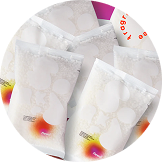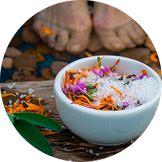You wake up exhausted. You eat “healthy,” move your body, try to sleep - but nothing lifts the weight, the fog, or that weird flatness you feel. It’s not your fault; you’re suffering from PCOS fatigue.
This frustrating condition slows you down and prevents you from handling your responsibilities the way you need to - let alone living life to the fullest. So why does PCOS cause fatigue, and what can you do to stop it? We’re here to help.
Learn how to treat PCOS fatigue below, from diet and lifestyle changes to our tried-and-true magnesium bath soak lineup. Each formula contains magnesium chloride with targeted nutrients to help calm your nervous system, reset your sleep, and gently bring energy back online.
Don’t let fatigue linger any longer. It’s time to regain control of how you feel on a day-to-day basis with support from Flewd Stresscare!
“I decided to use this product on my menstrual as my mental health usually declines especially day one. I entered the bath with a headache around my eyes and overall crappy mood. At first the scent was weird but as the product settled it was the most relaxing scent ever. My body slowly melted deeper into the bath and I closed my eyes and did a breathing practice.” - Tiana
“The stress relief has been a game changer for me. I have chronic medical conditions and work in a high stress job. The flewd soaks have really helped me in the last few weeks.” - Jennifer
“As someone with chronic stress/anxiety/depression...these soaks have been a great addition to my wellness routine✨️ I will warn you though, maybe use these in your bath before bedtime as it made me sleep like a log.” - Nicole
What is PCOS?
Polycystic Ovary Syndrome (PCOS) is a common hormonal condition that affects ovarian function. As many as 1 in 10 women of reproductive age suffer from it, but the truth is it’s probably more than that. Most women deal with it unknowingly.
Women with PCOS have higher-than-normal levels of androgens (male hormones), irregular ovulation, and small fluid-filled follicles (cysts) on the ovaries. You don’t need to have all three of these traits to have PCOS, for what it’s worth.
We don’t know the exact cause of the condition still, but experts believe it’s a mix of genetic and environmental factors. One risk factor is insulin resistance, as too much insulin in the body can prompt the ovaries to produce more androgens. This causes disruptions to ovulation.
The specific symptoms vary from person to person, but common signs of PCOS include irregular periods, acne, weight gain or difficulty losing weight, excessive hair growth (especially on the face or body), and hair thinning on the scalp.
Many also experience mood changes, anxiety, and heaviness as stress takes a toll. But perhaps the most frustrating of all is PCOS fatigue, as it makes even the most basic tasks feel exhausting and insurmountable. So, why does PCOS cause fatigue?
Does PCOS Cause Fatigue?
While it’s easy to chalk it up to a busy schedule, subpar nutrition, or poor sleep, PCOS fatigue tends to feel deeper and harder to shake. It rarely improves with rest alone, and many find it’s a daily struggle that zaps both physical energy and mental clarity.
So, why does PCOS cause fatigue? The reasons are complex, but can all be traced back to how PCOS disrupts balance across multiple systems in the body.
The Link Between Hormonal Imbalance and Energy Levels
Energy regulation takes a hit when hormones like insulin, cortisol, estrogen, and progesterone are out of sync. Unfortunately, high insulin levels come with PCOS - and this can cause blood sugar to spike and crash throughout the day. You feel wired one moment, wiped out the next.
Low progesterone levels (yet another hallmark of PCOS) can also get in the way of the body’s stress response, making it harder to stay calm and focused.
Any one of these hormonal imbalances would take a toll on your energy levels - but when multiple issues are occurring all the same time? It’s a recipe for disaster.
How Inflammation Drains Energy
PCOS is considered a low-grade inflammatory condition. Any sort of prolonged inflammatory response can force the immune system into a constant state of alert. This sucks energy and could lead to brain fog, muscle soreness, and that “worn down” feeling.
Sleep Issues Related to PCOS
You might already be all too familiar with how PCOS affects your sleep. It’s harder to fall asleep and stay asleep with this condition, which can be traced back to elevated cortisol at night, imbalanced melatonin levels, or physical discomfort like bloating or temperature dysregulation.
Sleep apnea is also more common in those with PCOS, especially in individuals having a particularly hard time with insulin resistance or weight gain.
Poor sleep compounds fatigue and sets up a vicious cycle where exhaustion leads to poor eating habits, more inflammation, and worsening symptoms the next day. Don’t worry, though. You’ll learn how to treat PCOS fatigue in just a few moments so you can get back on track.
What Does PCOS Fatigue Feel Like?
Let’s quickly clarify the difference between being tired and PCOS fatigue. So many people confuse fatigue for just being tired, and vice versa. They’re two very different things. Here’s how you can tell which you’re dealing with.
Physical Tiredness That Doesn’t Go Away With Sleep
The fatigue tied to PCOS doesn’t feel like just being tired after a long day, it’s a much deeper sort of exhaustion. You can sleep a full eight hours, even nap during the day, and still feel like you’re dragging.
Your muscles may feel heavy, your limbs slow to move, and it might take real effort just to get through basic tasks. It’s not a lack of willpower. Your body is running on low energy reserves but no amount of refueling moves the needle.
Mental Fog and Lack of Motivation
PCOS fatigue isn’t just a physical ailment, either. Brain fog can take hold of you as well. This is where your thinking feels slower, and it becomes harder to focus on things.
As a result, tasks that used to feel easy quickly become overwhelming. It doesn’t help that you have low physical energy so you don’t feel motivated to grind through the day.
Flare-Ups Around the Menstrual Cycle
PCOS-related fatigue often gets worse at specific points in your cycle. For some, it’s the days before their period. For others, it’s ovulation.
Whatever the case, these shifts often coincide with major hormonal fluctuations, insulin resistance peaks, or increased inflammation. All of these things drain your energy further.
But, it doesn’t have to be this way. We’ll show you how to treat PCOS fatigue below!
How to Treat PCOS Fatigue
Unfortunately, overcoming PCOS fatigue isn’t as simple as trying to get more sleep or eating better. You need to take much more specific steps to correct the hormonal and nutritional imbalances at play. We’ve laid it all out for you below - here’s how to treat PCOS fatigue.
Addressing Insulin Resistance and Blood Sugar Crashes
We recommend you focus first on improving insulin sensitivity to fight PCOS-related fatigue, starting with your meals. Build each plate around protein (at least 25–30g per meal), add a source of healthy fat like avocado or olive oil, and prioritize slow-digesting carbs such as:
- Sweet potatoes
- Lentils
- Steel-cut oats
Pairing protein and fiber with carbs helps slow glucose release so you won’t encounter as many mid-day crashes, especially after lunch. You should consider walking for 10-15 minutes after meals, too. It’s simple, but can blunt blood sugar spikes and improve insulin function over time.
Correcting Nutrient Deficiencies That Can Worsen Fatigue
Aside from eating better meals to improve insulin sensitivity, there are a few other dietary adjustments you might want to make. In this case, it’s less about slowing glucose release and more about filling in the gaps for nutrients your body needs most.
These include magnesium, B12, B6, zinc, iron, and vitamin D. It’s not a bad idea to ask your provider for bloodwork if you’ve been feeling the effects of PCOS fatigue so you can get a better idea of exactly where you’re falling short.
Supplementation can be helpful, but whole food is always your best bet from a nutrient deficiency perspective. Eat spinach and pumpkin seeds for magnesium, red meat and legumes for iron, eggs and salmon for B vitamins.
We’ll show you a better way to get magnesium and some of these other essential nutrients in a moment when we introduce you to the magnesium bath benefits.
Balancing Cortisol and Supporting the Adrenals
Chronic stress can push your cortisol into overdrive, inevitably leading to burnout. Creating a consistent wake-up and wind-down routine is an often overlooked strategy for supporting adrenal health.
So, try to get natural light in your eyes within 30 minutes of waking, avoid caffeine until at least 90 minutes after, and form a magnesium-rich evening ritual to signal safety and calm to your nervous system.
Stress isn’t going anywhere. It’s all around us, and an inescapable part of life. So rather than trying to avoid it, come up with better ways to cope with it. You can’t go wrong with one of our stress relief bath soak formulations at Flewd Stresscare!
Using Flewd Stresscare Bath Soaks as a Supportive Ritual
Our soaks were designed for moments like this - when your nervous system is taxed, your hormones are out of sync, and you need a reset that meets you where you are.
Every Flewd Stresscare soak starts with magnesium chloride, a highly bioavailable form that absorbs through the skin to bypass digestion and help restore depleted reserves. But we didn’t stop there. Each formulation targets a different piece of the fatigue puzzle:
- Ache Erasing Soak: Includes vitamins C & D and omega-3s to help reduce inflammation and relax tense muscles.
- Anxiety Destroying Soak: Blends B-complex vitamins and zinc with a coastal lime and floral scent to support nervous system calm when fatigue is tied to overstimulation and emotional burnout.
- Insomnia Ending Soak: Adds vitamins A & E and L-carnitine to promote restful sleep and circadian balance. Helps replenish energy when nights are restless or disrupted.
- Sads Smashing Soak: Features B3, B6, and nootropic lithium to gently support serotonin and mood stability, offering a boost when fatigue is paired with low emotional tone.
- Rage Squashing Soak: Includes chromium and B12 to help regulate cortisol and stabilize mood when stress spirals trigger fatigue.
- Panic Crushing Soak: Supports hormone balance and muscular calm with boron, omega-3s, and a grounding wood-floral scent - ideal for moments of overwhelm.
From our muscle bath soak to our anxiety bath soak, everything is 99% natural, vegan, biodegradable, and actually enjoyable to incorporate into your ritual.
Simply fill a tub with warm water and dump an entire packet in, ideally before bed or after a demanding day. You can soak for 20-30 minutes a few times a week to provide your body with stress-busting support. Try our epsom salt substitute today!
Improving Sleep Quality and Recovery
Poor sleep is both a symptom and a cause of PCOS fatigue, so it deserves attention. Begin by optimizing your sleep environment if you're waking up tired: blackout curtains, cooler room temp (60-67°F), and screen limits 60 minutes before bed.
You could also try incorporating calming rituals like breathwork, reading fiction, or taking a bath with the Insomnia Ending soak 90 minutes before bed if falling asleep is still a struggle. Which magnesium is best for sleep? Magnesium chloride, so you can’t go wrong!
When to Talk to a Healthcare Provider About Fatigue
Hopefully, these tips on how to treat fatigue help you regain your energy and mental clarity. But if you’ve covered the basics and you’re still dragging, talk to a provider who understands PCOS.
Persistent fatigue may be tied to thyroid dysfunction, chronic inflammation, or other overlapping conditions like anemia or sleep apnea. Lab work and expert guidance can help you stop guessing and start getting answers.
Parting Thoughts on PCOS and Fatigue
PCOS fatigue isn’t just “being tired.” It’s systemic, frustrating, and deeply misunderstood. But it’s not permanent - and this guide on how to treat PCOS fatigue should help you get back on track.
Our blog has a similar resource on how to combat fatigue from birth control if you want to learn more. But whether you’re looking for the best magnesium for stress, sleep, recovery, or energy, your search ends here at Flewd Stresscare.
Remember, real progress comes from small, strategic shifts - including rituals that support your body’s rhythm. Flewd Stresscare soaks are designed to be part of that shift, offering nervous system support and deep replenishment when you need it most.
Bring magnesium back into your nightly ritual and see for yourself what a difference it can make!
























































